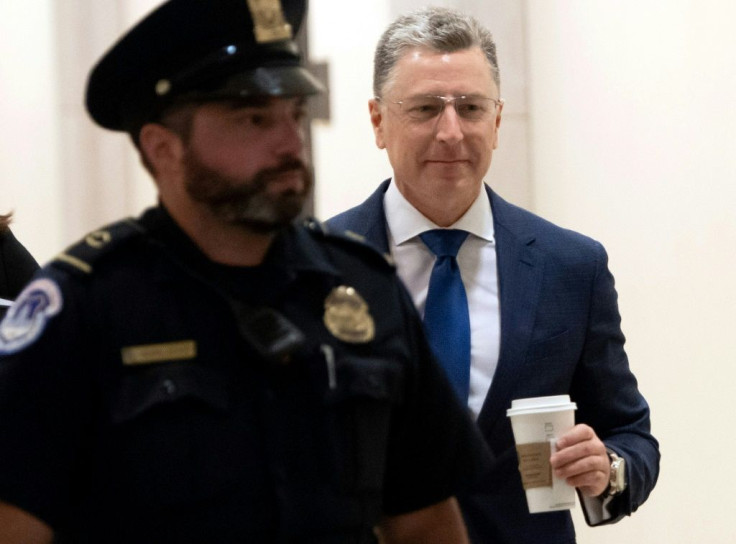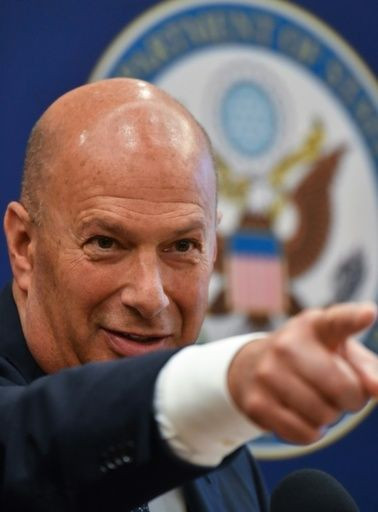Smoking Text? Diplomats Bring Drama To Ukraine Scandal

Senior US diplomats helped coordinate Trump administration efforts to pressure Ukraine into investigating the American president's political rivals in return for aid and access, the envoys' released messages show.
Kurt Volker, Donald Trump's special representative on Ukraine until last week when he abruptly resigned, turned over text messages to the three US House panels conducting the impeachment inquiry that has thrown Trump's presidency into jeopardy.
Republican defenders of the president say the dozens of texts show no wrongdoing, while Democrats say they confirm that Trump is bending the government machinery to serve his political benefit.
In their messages, top US diplomats discussed leveraging a potential summit between Trump and Ukraine's newly inaugurated President Volodymyr Zelensky on a pledge to investigate 2016 election interference and a company that employed the son of Joe Biden, the frontrunner in the Democrat race to challenge Trump in 2020.
Volker, a former US envoy to NATO and a respected diplomat, was summoned before Congress Thursday for a closed-door deposition.
It lasted eight hours, and the texts were released that night. Here are highlights:
July 19-20: Before Trump-Zelensky call
US diplomats, backed by Trump's personal attorney Rudy Giuliani and in coordination with a Zelensky aide, prepare a possible phone call between the two heads of state.
"Most impt is for Zelensky to say that he will help investigation," Volker texts on July 19 to US charge d'affaires in Kiev, Bill Taylor, and US envoy to the European Union Gordon Sondland, a major donor to Trump's 2016 campaign.
Taylor, the next day: "President Zelenskyy is sensitive about Ukraine being taken seriously, not merely as an instrument in Washington domestic, re-election politics."
July 25: W.House meeting if Kiev investigates
Just before the Trump-Zelensky call, Volker drops a key tip to Zelensky aide Andrey Yermak: "Heard from White House -- assuming President Z convinces trump he will investigate/'get to the bottom of what happened' in 2016, we will nail down date for visit to Washington. Good luck!"
August: The 'statement'
The Americans were now asking Ukrainians to prepare "a draft statement" in which they would commit to investigating Burisma, the natural gas company that employed Biden's son Hunter, and alleged Ukrainian interference in the 2016 election -- a debunked conspiracy theory -- in exchange for a presidential White House visit.

Volker on August 9 texts fellow diplomats and Giuliani, asking if they can talk by phone "to make sure I advise Z correctly as to what he should be saying."
Yermak texts back the next day: "Once we have a date, will call for a press briefing, announcing upcoming visit and outlining vision for the reboot of US-UKRAINE relationship, including among other things Burisma and election meddling in investigations."
"Sounds great!" Volker responds 20 seconds later.
Volker then shares text of a draft Ukrainian statement with his US colleagues on August 13.
"We intend to initiate and complete a transparent and unbiased investigation of all available facts and episodes, including those involving Burisma and the 2016 US elections," it says.
September: Misgivings
By late August, Kiev has become concerned about Trump's suspension of nearly $400 million in military aid to Ukraine.
On September 1, Taylor addresses the elephant in the room: "Are we now saying that security assistance and WH meeting are conditioned on investigations?"
"Call me," Sondland responds.
Taylor, at the time the top US official in Ukraine and not a political appointee, expresses more explicit reservations to Sondland September 9: "As I said on the phone, I think it's crazy to withhold security assistance for help with a political campaign."
Several hours later, Taylor receives Sondland's carefully crafted response.
"Bill, I believe you are incorrect about President Trump's intentions," the Trump donor-turned-diplomat writes.
"The President has been crystal clear no quid pro quo's of any kind, he says, adding: "I suggest we stop the back and forth by text."
© Copyright AFP 2024. All rights reserved.




















